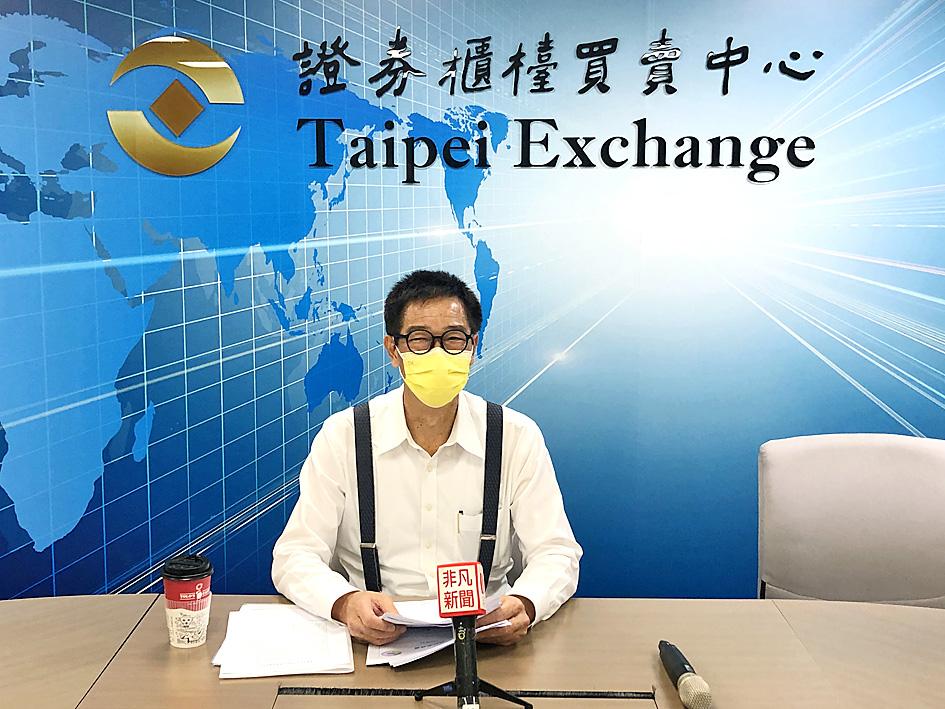United Microelectronics Corp (UMC, 聯電), Taiwan’s second-largest contract chipmaker, is to set up a strategic partnership with IC packaging and testing services provider Chipbond Technology Corp (頎邦科技) through a share swap, the company said on Friday.
Aiming to acquire a 9.09 percent stake in Chipbond, the chipmaker said that shares would be swapped at a rate of one common UMC share for 0.87 common shares of Chipbond.
The deal would result in the IC packaging and testing firm holding a 0.62 percent stake in UMC, it said.

Photo: CNA
UMC would become Chipbond’s largest shareholder, it added.
The chipmaker said the two companies’ boards of directors have approved the deal, but did not disclose when the share swap is scheduled to be completed.
The agreement includes the issuance of 61.11 million new UMC shares, it said.
Those shares, as well as 16.08 million UMC shares held by its subsidiary Fortune Venture Capital Corp (宏誠創投), would be exchanged for 67.15 million newly issued Chipbond shares, it added.
Based on Chipbond’s closing price of NT$81.10 per share on the Taipei Exchange on Friday, which was up 2.4 percent, the share swap would be valued at about NT$5.45 billion (US$196.73 million).
Shares of UMC soared 9.38 percent to end at NT$70 in Taipei trading on Friday.
Describing UMC as one of the important upstream wafer foundry operators in Taiwan’s semiconductor industry, analysts said that the move showed the firm’s ambitions to integrate resources in the industry’s upstream and downstream segments.
The move follows bigger rival Taiwan Semiconductor Manufacturing Co’s (TSMC, 台積電) inroads into the high-end IC packaging and testing market.
Unlike TSMC, which set up its own production lines, UMC is seeking to form partnerships with IC packaging and testing services suppliers, including an existing stake in King Yuan Electronics Co (京元電子).
Announcing the Chipbond deal at a news conference in Taipei on Friday, UMC chief financial officer Liu Chi-tung (劉啟東) said that his company is the first contract chipmaker in Taiwan to supply chips for producing driver ICs for use in flat panels, while Chipbond has become a leader in Taiwan’s IC packaging and testing services industry, specializing in flat panel drive ICs.
Under the partnership, the two companies are determined to work more closely in the drive IC sector and expedite the rollout of chips for flat panels, Liu said.
Chipbond had previously planned to launch a private placement, but the project was rejected during its annual general meeting earlier this year.
Analysts said the rejection’s silver lining is that it allowed Chipbond to forge ties with UMC, helping its management solidify its position.
Chipbond, which posted earnings per share of NT$5.61 last year, issued a cash dividend of NT$3.8 per share, with a payout ratio of 67.7 percent.
In the first half of this year, Chipbond posted earnings per share of NT$3.96, up 58.4 percent from a year earlier.
Analysts said that based on Chipbond’s improving bottom line, UMC might profit from large future cash dividends on its take in the firm.
Asked about the IC firm’s outlook, Chipbond chairman Wu Fei-jain (吳非艱) said that a supply shortage of drive ICs for flat panels is expected to continue through the end of next year.
Chipbond raised its product prices in the third quarter, the fourth consecutive quarterly raise, Wu said, adding that there was no immediate plan for a price increase in the fourth quarter.

In Italy’s storied gold-making hubs, jewelers are reworking their designs to trim gold content as they race to blunt the effect of record prices and appeal to shoppers watching their budgets. Gold prices hit a record high on Thursday, surging near US$5,600 an ounce, more than double a year ago as geopolitical concerns and jitters over trade pushed investors toward the safe-haven asset. The rally is putting undue pressure on small artisans as they face mounting demands from customers, including international brands, to produce cheaper items, from signature pieces to wedding rings, according to interviews with four independent jewelers in Italy’s main

Japanese Prime Minister Sanae Takaichi has talked up the benefits of a weaker yen in a campaign speech, adopting a tone at odds with her finance ministry, which has refused to rule out any options to counter excessive foreign exchange volatility. Takaichi later softened her stance, saying she did not have a preference for the yen’s direction. “People say the weak yen is bad right now, but for export industries, it’s a major opportunity,” Takaichi said on Saturday at a rally for Liberal Democratic Party candidate Daishiro Yamagiwa in Kanagawa Prefecture ahead of a snap election on Sunday. “Whether it’s selling food or

CONCERNS: Tech companies investing in AI businesses that purchase their products have raised questions among investors that they are artificially propping up demand Nvidia Corp chief executive officer Jensen Huang (黃仁勳) on Saturday said that the company would be participating in OpenAI’s latest funding round, describing it as potentially “the largest investment we’ve ever made.” “We will invest a great deal of money,” Huang told reporters while visiting Taipei. “I believe in OpenAI. The work that they do is incredible. They’re one of the most consequential companies of our time.” Huang did not say exactly how much Nvidia might contribute, but described the investment as “huge.” “Let Sam announce how much he’s going to raise — it’s for him to decide,” Huang said, referring to OpenAI

The global server market is expected to grow 12.8 percent annually this year, with artificial intelligence (AI) servers projected to account for 16.5 percent, driven by continued investment in AI infrastructure by major cloud service providers (CSPs), market researcher TrendForce Corp (集邦科技) said yesterday. Global AI server shipments this year are expected to increase 28 percent year-on-year to more than 2.7 million units, driven by sustained demand from CSPs and government sovereign cloud projects, TrendForce analyst Frank Kung (龔明德) told the Taipei Times. Demand for GPU-based AI servers, including Nvidia Corp’s GB and Vera Rubin rack systems, is expected to remain high,